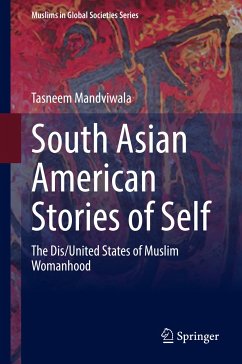This book acknowledges and discusses the now politically infamous aspects of an American Muslim woman's life such as Islamophobia and hijab, but it more importantly examines how women actually deal with these obstacles, intentionally shifting the lens to capture a more holistic, nuanced understanding of their human experiences. This text is based on a three-year-long qualitative interdisciplinary cultural and developmental psychology and gender systems study. It uniquely organizes risks, protective factors, and coping mechanisms according to developmental life stages, from teenage to adulthood. Results show how second-generation Muslim American women's identities develop during adolescence (11-18), emerging adulthood (19-29), and adulthood (30-39) within multiple socio-cultural contexts.
Discussions regarding Muslim Americans often erroneously equate "Muslim" with "Arab" or "Middle Eastern." By focusing on South Asian Muslim Americans, this work bluntly discusses the overlaps of South Asian culture with Islam, an important contribution to the field since the majority of immigrant Muslims in America are of South Asian descent. This study adds nuance and detail to American Muslim girls' and women's experiences while fighting misinformation and stereotypes. It is a significant contribution to anthropological developmental psychology and cultural psychology. The focus on a historically academically marginalized population is beneficial to students, researchers, and professionals in the field.
Discussions regarding Muslim Americans often erroneously equate "Muslim" with "Arab" or "Middle Eastern." By focusing on South Asian Muslim Americans, this work bluntly discusses the overlaps of South Asian culture with Islam, an important contribution to the field since the majority of immigrant Muslims in America are of South Asian descent. This study adds nuance and detail to American Muslim girls' and women's experiences while fighting misinformation and stereotypes. It is a significant contribution to anthropological developmental psychology and cultural psychology. The focus on a historically academically marginalized population is beneficial to students, researchers, and professionals in the field.
Dieser Download kann aus rechtlichen Gründen nur mit Rechnungsadresse in A, B, BG, CY, CZ, D, DK, EW, E, FIN, F, GR, HR, H, IRL, I, LT, L, LR, M, NL, PL, P, R, S, SLO, SK ausgeliefert werden.









